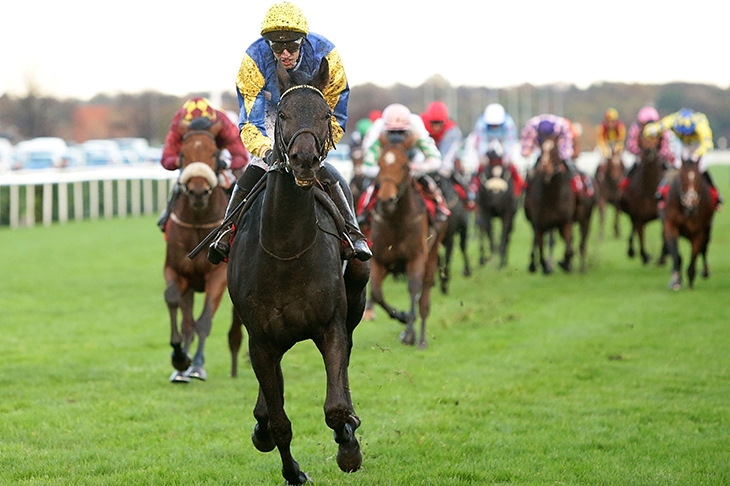Watching whip-thin jockey George Baker, just short of six feet, greeting his mounts used to make me think of the weight-reducing regime described by the 1920s rider Jack Leach. The elegant Leach always dined well. Next day he would go jogging in three sets of underwear, four sweaters and a rubber suit before taking a Turkish bath. He took off extra weight so that at the track he could have a sandwich and a glass of champagne. ‘This made me feel like a new man, and if I had a few ounces to spare the new man got a glass too.’ Not quite how modern riders do it in these breath-testing days.
George Baker suffered a growth spurt and in a matter of months moved from riding comfortably at 8st 1lb to ‘having to waste my arse off to do 8st 9lb’. Sadly, he is no longer riding. In September 2016 he was in his prime, having partnered Harbour Law to win the St Leger. In February last year, substituting for another rider, he went to ride on the snow in St Moritz. His horse broke a leg and in a hideous fall George suffered massive bleeds on the brain. Having post-traumatic amnesia for 24 hours is serious; he endured it for four weeks. But when I met him at Newbury last month you would scarcely have known he had been ill apart from a certain stiffness in his walk. His autobiography Taking My Time (Racing Post, £20) is therefore not just the usual jockey’s tale of tough contests on the track, favourite horses ridden (like the game Premio Loco), and nights out with the boys. It is also a hugely encouraging story of how a man and his wife have coped with life-changing trauma at the age of just 34.
Wife Nicola takes over a section of the book to describe the period in hospital that remains nothing more than a blur to George when he was belting out Adele’s ‘Hello’ at the top of his voice, crouching like a dog on the bed because he had watched Crufts on his iPad and mixing steak, mashed potato, orange juice and ice cream into a single gooey mass to eat. He would ask Nicola to tip the porters they met as she wheeled him around the hospital and proposition pretty nurses in front of her. There have been plenty of downs as well as ups — weepy moments, tantrums of sheer frustration, cleanliness phobias — but this is a brave story of a journey back to near-normality. George has intriguing reflections, too, on the practicalities of his trade, insisting that not enough is made of getting horses to relax, and that it is much easier to get horses to perform well by making them want to do it. The physical effort, he says, is a bit of an illusion: you often have to kid horses along. He reckons that fewer than 10 per cent of them actually want to win.
Horses, of course, don’t know the names they race under. When Colonel Edward Riley acquired an animal called Bad News he asked the previous owners why it was so called. Because, they said, they had heard that ‘bad news travels fast’. It won him 47 races over the next eight years. Well chosen names include Au Renoir, by Peintre Celebre out of Goodbye, and Wait For The Will, by Seeking The Gold out of You’d Be Surprised. With Fifty Shades of Hay (Racing Post, £12.99) David Ashforth, an indefatigable researcher as well as the wittiest man writing about racing, has provided the punter’s perfect bedside compendium. He includes my old favourite Pot00000000. That animal was originally to be called Potatoes but when the Earl of Abingdon asked a stable boy to write out the name the lad chalked it that way and the Earl retained it.
David tells us how major owners like the Queen choose their horses’ names, although naturally she doesn’t figure in the chapter headed ‘Sexcetera’, which concentrates on naughty titles such as Soixante-Neuf, Sheila Blige and Hoof-Hearted. Hayley Turner has had to endure winning on the likes of Wunderbra, Bouncy Bouncy and Juicy Pear while rather more sophisticated was the naming of Geespot, by Pursuit of Love out of My Discovery. The asides provide as much fun as the monikers in the Ashforth collection. Of the animal called Henry Kissinger he notes: ‘An enormous amount has been written about Henry Kissinger, quite a lot of it by Henry Kissinger.’ On My Ex-Wife’s Ashes David reflects: ‘Possibly not named out of affection. Won at Penn National in 2003.’
Having taken over his famous father’s franchise, Felix Francis still puts ‘A Dick Francis novel’ on the cover of his books. Since Crisis (Simon & Schuster, £20), the tale of a crisis-manager’s encounter with a dysfunctional Newmarket training family, is the eighth he has produced alone he surely no longer needs that sales aid. As ever, it is pacey and professional although it feels strange for an author steeped in racing to speak through a hero who knows it so little.






Comments